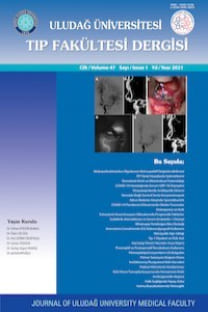İnsülin Kullanan Tip 2 Diabetes Mellituslu Hastalarda Diyabet Eğitimi ve Metabolik Kontrol
Diabetes mellitus uzun dönemde dejeneratif komplikasyonlara yol açabilen kronik bir hastalıktır. Glisemik kontrol komplikasyonların gelişimini engelleyebilir. Bu çalışmada insülin kullanan tip 2 diabetes mellituslu hastalarda sık tekrarlı diyabet eğitiminin uzun dönemde glukoz ve lipid metabolizması üzerine etkisini değerlendirmeyi amaçladık. Kronik komplikasyonsuz 130 hasta retrospektif olarak incelendi. 53 hastanın eğitim ve tedavi programını tamamladığı (eğitim gurubu), 77'sinin sadece tedaviye devam ettiği saptandı (kontrol gurubu). Her iki guruptaki hastaların yaş, cinsiyet, diyabet süreleri, başlangıç kan basıncı (KB) ve metabolik değerleri benzerdi. Eğitim gurubundaki hastaların eğitim sonrası A1C, açlık ve tokluk kan şekeri ve sistolik KB değerleri anlamlı düşerken kontrol gurubunda sistolik KB değeri anlamlı arttı. Eğitim gurubunda HDL-kol düzeyleri 6. ayda 40 ± 9 mg/dl'den 49 ± 14 mg/dl'ye yükseldi. Çalışmamız kapsamlı ve sık tekrarlı bir diyabet eğitim programının metabolik kontrolün sağlanmasında etkili olduğunu düşündürmektedir.
Diabetes Education and Metabolic Control in Patients With Type 2 Diabetes Mellitus Under Insulin Treatment
Diabetes mellitus is a chronic disease which may lead to degenerative complications in long-term. Effective glycemic control can prevent the occurence of complications. The aim of this study was to evaluate the effect of repeated diabetes education programme given in long term on glucose and lipid metabolisms in type 2 diabetes mellitus patients under insulin treatment. One hundred thirty patients without chronic complications were retrospectively evaluated. Fifty three patients completed the education and therapy programmes (education group) while 77 only joined the therapy programme (control group). The age, gender, diabetes duration, baseline blood pressure (BP) and metabolic parameters of the patients in both groups were similar. A1C, fasting and post-prandial glucose levels and systolic BP values of the patients in the education group significantly decreased after the education while systolic BP value increased in the control group. In the education group HDL-chol levels increased from 40 ± 9 mg/dl to 49 ± 14 mg/dl at 6th month. Our study suggests that a comprehensive and frequently repeated diabetes education programme is effective in the achievement of metabolic control.
